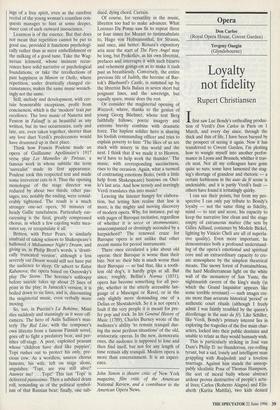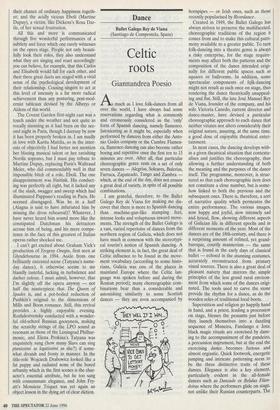Opera
Don Carlos (Royal Opera House, Covent Garden)
Loyalty not fidelity
Rupert Christiansen
Ifirst saw Luc Bondy's enthralling produc- tion of Verdi's Don Carlos in Paris on 1 March, and every day since, through the thick and thin of life, I have been buoyed by the prospect of seeing it again. Now it has transferred to Covent Garden, I'm plotting how to wangle myself into another perfor- mance in Lyons and Brussels, whither it trav- els next. Not all my colleagues have gone quite so nuts: some have lamented the stag- ing's shortage of grandeur and rhetoric — a certain feebleness in the auto da fe scene is undeniable, and it is partly Verdi's fault others have found it irritatingly quirky.
I can see their points, but from my per- spective I can only pay tribute to Bondy's loyalty — not the same thing as fidelity, mind — to text and score, his capacity to keep the narrative line clean and the stage empty of extraneous matter (the sets by Gilles Aillaud, costumes by Modele Bickel, lighting by Vinicio Cheli are all of superla- tive quality). Even more important, he demonstrates both a profound understand- ing of the opera's emotional and spiritual core and an extraordinary capacity to cre- ate atmosphere by the simplest theatrical means. The snowy forest of Fontainebleau, the hard Mediterranean light on the white wall of the monastery of San Yuste, the nightmarish cavern of the king's study (in which the Grand Inquisitor appears like some terrible revenant) — such images cre- ate more than accurate historical 'period' or authentic court rituals (although I freely admit I was faintly troubled by the queen's décolletage in the auto da fe'). Like Schiller, like Verdi, Bondy's primary interest lies in exploring the tragedies of the five main char- acters, locked into their public destinies and unable to relate as they would humanly wish. This is particularly striking in Jose van Dam's Philip II: no thunderous, eye-rolling tyrant, but a sad, lonely and intelligent man grappling with Realpolitik and a loveless marriage. Against him stands the unstop- pably idealistic Posa of Thomas Hampson, the sort of moral bully whose abstract ardour proves destructive of people's actu- al lives; Carlos (Roberto Alagna) and Elis- abeth (Karita Mattila), two kids denied their chance of ordinary happiness togeth- er; and the acidly vicious Eboli (Martine Dupuy), a victim, like Dickens's Rosa Dar- tle, of her sexual frustration.
All this and more is communicated through five wonderful performances of a subtlety and force which one rarely witnesses on the opera stage. People not only beauti- fully look their roles, they also understand what they are singing and react accordingly: you can believe, for example, that this Carlos and Elisabeth would fall for each other, and their three great duets are staged with a vivid sense of the psychological development of their relationship. Coaxing singers to act at this level of intensity is a far more radical achievement than any posturing, post-mod- ernist tableaux devised by the Albetys or Aldens of this world.
The Covent Garden first-night cast was a touch under the weather and not quite as vocally stunning as it had been on the sec- ond night in Paris, though I daresay by now it has been properly broken in. I am madly in love with Karita Mattila, so in the inter- ests of objectivity I had better not mention her blazing musical talent or her ravishing Nordic soprano, but I must pay tribute to Martine Dupuy, replacing Paris's Waltraud Meier, who did commendably well in that impossible bitch of a role, Eboli. The one disappointment was Haitink. His conduct- ing was perfectly all right, but it lacked any of the slash, swagger and sweep which had illuminated Pappano's reading in Paris. He seemed disengaged. Was he in a huff (Alagna is said to have infuriated him by missing the dress rehearsal)?. Whatever, I have never heard him sound more like the constipated Dutchman his detractors accuse him of being, and his mere compe- tence in the face of this greatest of Italian operas rather shocked me.
I can't get excited about Graham Vick's production of Yevgeny Onegin, first seen at Glyndebourne in 1994. Aside from one brilliantly executed scene (Tatyana's name- day dance), it otherwise seems to me blandly tasteful, lacking in turbulence and darker colour. I must admit, however, that I'm slightly off the opera anyway — not half the masterpiece that The Queen of Spades is, and a pot-boiled reduction of Pushkin's original to the dimensions of Mills and Boon romance. Still, this revival provides a highly enjoyable evening. Rozhdestvensky conducted with a wonder- ful old-school Russian gooeyness, making the scratchy strings of the LPO sound as resonant as those of the Leningrad Philhar- monic, and Elena Prokina's Tatyana was exquisitely sung (how many Slays can sing pianissimi as legatissimi as she?) if some- what divaish and frosty in manner. In the title-role Wojciech Drabowicz looked like a fat puppy and radiated none of the bored urbanity which in the first scenes is the char- acter's essential attribute, but he too sang with consummate elegance, and John Fty- att's Monsieur Triquet was yet again an object lesson in the dying art of clear diction.



























































 Previous page
Previous page